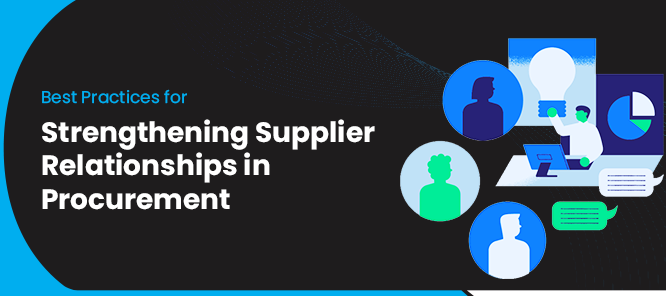
April 2, 2025 Sanjay Puri
Best Practices for Strengthening Supplier Relationships in Procurement
Why Supplier Relationships Are Crucial in Procurement?
In procurement, conversations around supplier relationships are often discussed but not always fully understood. Why do supplier relationships matter so much? Through extensive research, we have identified the major reasons why modern procurement requires strong supplier cooperation for success.
In today's fast-paced global economy, procurement is no longer about achieving the lowest price for goods and services. Instead, organizations should prioritize strong supplier relationships to ensure business continuity, cost efficiency, innovation, supply chain flexibility, and better risk management. A well-managed supplier relationship ensures mutual trust, streamlined operations, and long-term strategic benefits.
According to a recent Deloitte report, 79% of procurement leaders acknowledge that effective supplier collaboration is critical in mitigating risks and improving overall business performance. Additionally, organizations that implement a structured Supplier Relationship Management (SRM) strategy benefit from 15–30% cost savings through better negotiations, process efficiency, and value co-creation.
What is Supplier Relationship Management (SRM) in Procurement?
Supplier Relationship Management (SRM) is a strategic approach focused on managing interactions with suppliers to maximize value and ensure long-term business success. It includes collaboration, communication, and performance monitoring to improve procurement efficiency and strengthen supply chains.
An SRM system helps organizations classify suppliers based on importance and influence, allowing them to prioritize high-value relationships and streamline procurement operations.
The Importance of SRM in Procurement
- Risk Mitigation: Better risk evaluation and supply continuity during disruptions.
- Cost Efficiency: Cost savings through process improvements and value engineering.
- Innovation: Co-develop innovative solutions with suppliers.
- Quality Enhancement: Ensure high standards and continuous improvements.
Key Components of SRM Process
- Supplier Division & Classification: Based on spend analysis, risk, and strategic value.
- Supplier Onboarding & Compliance: Standardized onboarding with document checks (GST, PAN, ISO).
- Supplier Performance Management: Monitor KPIs like on-time delivery, defect rates, and cost variance.
- Contract Lifecycle & Risk Management: Digital contract workflows with alerts and risk profiling.
- Procurement Spend Analysis: Automated insights for cost optimization and supplier consolidation.
Best Practices for Strengthening Supplier Relationships
- Develop a Clear Strategy: Align SRM goals with business objectives and identify key suppliers.
- Foster Transparent Communication: Use meetings, performance reviews, and digital tools.
- Leverage Technology: Implement SRM systems for automation and collaboration.
- Build Trust & Partnerships: Honor terms, involve suppliers in R&D, and reward excellence.
- Supplier Performance Evaluation: Use scorecards for metrics like delivery, quality, and compliance.
- Risk Management Collaboration: Assess risks, diversify suppliers, and plan for disruptions.
Future Trends in SRM
- AI & Machine Learning: Predict supplier risk with historical data.
- Blockchain: Secure and transparent transactions.
- Self-Serve Supplier Portals: Real-time invoice and order tracking.
- Digital Twin Technology: Simulate supply chain scenarios for optimization.
According to Statista, AI-driven SRM solutions will grow by 35% annually by 2028.
Wrap Up
Supplier Relationship Management (SRM) is not just about managing contracts—it’s about building long-term partnerships that drive success. By using best practices like transparent communication, digital tools, and collaborative risk strategies, companies can reduce costs, improve operations, and build a resilient supply chain.
With AI-powered procurement platforms like C1’s end-to-end solutions, businesses can automate supplier management, streamline processes, and ensure compliance for a more agile and competitive edge.
Ready to transform your supplier relationships? Explore C1’s advanced procurement solutions today!
Smart Solutions for Smart Procurement
Get in touch with C1 Global to get all the details on our best-in-class offerings or to schedule a demo.
0 Comments:
Leave a Reply